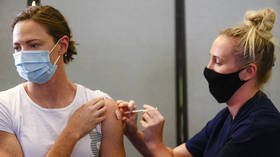Australia’s top doctors’ body opposes PM’s ‘surprise’ move to defy health advice and allow AstraZeneca shots for people under 40

Australia’s top medical body has refused to endorse a sudden shift in Covid-19 vaccination policy after Prime Minister Scott Morrison went against expert advice by allowing people under 40 to get the AstraZeneca shot.
According to the latest available recommendations from the independent Australian Technical Advisory Group on Immunization (ATAGI), the Pfizer vaccine is preferred over the AstraZeneca shot for those aged under 60 due to the latter posing an increased risk of rare, but deadly, blood clots in younger people.
That advice had not changed when Morrison made an announcement Monday night, describing the ATAGI recommendation as a “preference” and stating that it did not “preclude” people under that age threshold from “having a discussion” with their doctors about receiving the AstraZeneca shot.
Noting that the decision had come as a surprise, Australian Medical Association (AMA) President Dr. Omar Khorshid told the Guardian Australia, “It’s hard to know how to take that announcement because I think it’s going to be a limited number of people to take it up, given that they would be going against the expert ATAGI recommendation.”
“Our recommendation is still really for patients to follow the ATAGI advice. Be patient and have the ATAGI-recommended vaccine when it’s available. I am certainly still backing the expert advice at this stage,” Dr. Khorshid said.
Also on rt.com Australia limits AstraZeneca Covid jab to over-60s days after second blood clot death ‘likely linked’ to the vaccineDespite the announcement, Australians over the age of 60 will continue to be a priority group for the AstraZeneca vaccine. Those under 40, with the exception of people in far-flung areas, have only had limited access to the shot so far and would have had to wait until adequate progress had been made in vaccinating other age groups.
The country is battling a third wave of infections with the emergence of the Delta variant triggering lockdowns in a number of affected areas.
However, vaccine rollout has been sluggish in Australia in part due to supply problems since it does not have the large-scale manufacturing capacity to make the Pfizer vaccine. While there are plenty of the domestically produced AstraZeneca doses, concerns about blood clots have dented confidence in it.
According to an AMA official, the most recent reports had pegged the risk of blood clotting after the first dose of the AstraZeneca shot at 3.1 cases per 100,000 for those under 50 and 2.7 per 100,000 for 50-59 year olds. Following the second dose, there is a risk of about 1.5 per million, the official said.
When asked for his thoughts on the announcement being made without consulting the AMA, Dr. Khorshid guessed that the intent may have been to “provide nervous Australians who are going into lockdown this week with something that they can actually do to improve their chances of getting through this.”
Although he noted that doctors needed to be kept in the loop about such changes, Dr. Khorshid said the move “addresses a demand that is out there in the community” for vaccines.
Also on rt.com Indians cry ‘discrimination’ as AstraZeneca’s local vaccine left off EU’s green list, but identical European-made one includedSeveral Australian state premiers and health officials have also pushed back the Morrison government’s decision, with some countering the announcement by recommending that state authorities should continue to follow ATAGI’s advice.
Both Queensland premier Annastacia Palaszczuk and its chief health officer reiterated support for the “clinical advice from ATAGI.” Meanwhile, Western Australian premier Mark McGowan and Victoria health minister Martin Foley have said the decision was taken by the Morrison government and not by the national cabinet.
In response, Federal Health Minister Greg Hunt told reporters there had been “no change to the medical advice” and that the move was “simply a recognition that the access for those who wish to make an informed consent decision can be broadened, consistent with the supply.”
If you like this story, share it with a friend!














